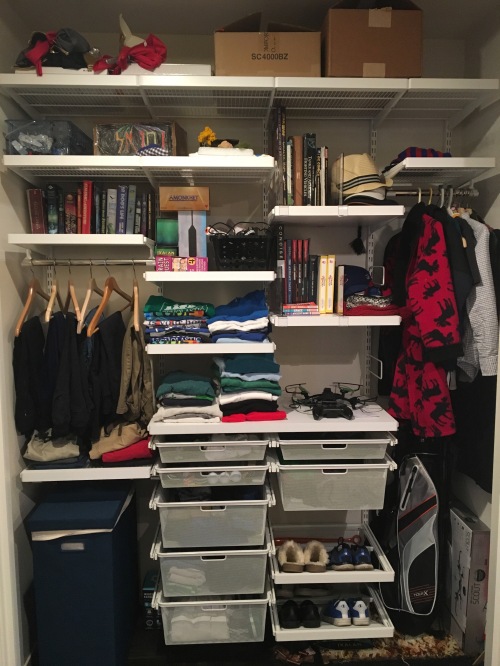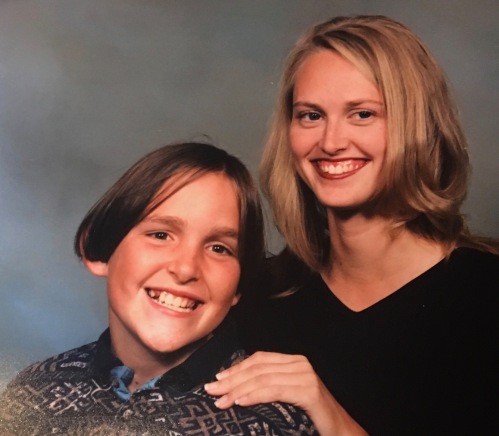
Updated to add: The following post was inspired by this discussion, which I thought I linked to, but NOPE!
The topic of household organization seems to be currently dominated by the narrative that people need to tackle both the decluttering and organizing of their whole house ALL AT ONCE. The people who do this spend large amounts of precious time and energy, and it’s very emotional. The entirety of a person’s stuff so often symbolizes a whole life–lost loved ones, unmet expectations, the past. Once this painful process is completed, the story goes, you are done with organizing and decluttering, forever.
But some hard-won lessons have shown me that:
Having an organized and functional home doesn’t require staying up all night or crying
Caveat: being neat comes easily to me. I can’t stand seeing clutter and chaos. However, until recently I was not necessarily that organized. My style featured clean surfaces, no outward clutter and pretty rooms. But if you opened certain cabinets or my closet, it was kind of a hot mess.
My husband would rather have visible clutter than disorganized closets and dysfunctional organization.
So instead of fighting, we teamed up over the last year, and focused on making the storage areas work for our lives and needs. Eventually, there was a place for everything, and everything was in its place. We now save time and energy, for real. There’s no more looking through some pile of stuff for a karate belt, or a mad search for an iphone.
Here is our common sense approach:
1. Approach organization first and foremost as a way to improve your functionality
Don’t bother with organization systems or approaches if they are targeted to just women, if you are part of a couple. Husbands and partners should be equally as involved, invested and part of this process. After all, the home is filled with half their stuff! Skip methods that focus on closets looking twee, rather than actually improve the way you live your life.
Think about what is causing your household to waste time. Can you never find your keys or phone? Does it take you forever to pick what to wear each day? If you have kids, are they late to school because they can’t find their shoes? Do you have to wade through paper to find bills to pay?
2. Organize and declutter room by room (or closet by closet)
Keep your goal of making life easier in mind, but start in one small space, like a closet or the kitchen cabinet with your dry goods. Just tackle that one space in an hour or two, on a weekend. If the area has stuff for multiple people, handle this with your partner. Discuss the uses of each item, or category of items, as you go through. Decide what goes, what stays. Have a bag (or bags) ready, to make it easy to donate or discard. This process of removing stuff that you don’t need is called decluttering, by the way. I’m not sure that is clear sometimes!
Once you are done with that one space, you will probably feel a rush of accomplishment, and that is a pretty addictive feeling. Move on to another space another weekend, and so on. We organized most of our areas in one year.
3. Solve for the way you actually live, not the way you want to live
We all have of ideal versions of ourselves, and it can be tough to let them go. Maybe we think we’ll take up painting again, or refine our collection of baseball cards from 1996. Maybe we don’t want to give up old clothes that don’t fit us (and never will).
This is the emotional part, and it can be hard to let go of past selves. However, handling this process of letting go in a small way, as opposed to in a huge, emotional, traumatic whirlwind, is MUCH easier to bear.
3. Keep a few select items from your past that mean the most
Hardest of all when going through the kids’ closets was deciding what to do with the baby clothes. I have given most of these away to friends and family at this point, but I also kept a small, pretty mesh box with select items that I cherished the most. I see that box when I open the linen closet, and it makes me smile.
4. Don’t even bother trying to have an organized play area if you have kids under 5
We had one area of the house that was just the kids’ for a long time, and we resigned ourselves to the fact that it would be a disaster. In terms of our time and energy, that area was a black hole. If I organized all the Legos (Which takes a ton of time! There are so many different sets!) inevitably 15 minutes later they would be all over the floor again.
I actually think that a disorganized play area can lead to more imagination. Our son built complex towers and figures out of different Legos, Playmobils and blocks and my daughter staged intricate plays with the random toys scattered about. Or maybe that’s just a rationale. Whatever. 🙂
5. Use drawers as little as possible, if possible
You can’t see what’s in a closed, solid drawer, which makes what is inside somewhat invisible to your eye and mind. For clothes, I prefer open shelving to drawers. I can stack like items together, and it’s easy to see what’s what. Long sleeved shirts are stacked with long sleeved shirts, t-shirts are stacked with other t-shirts. Exercise clothes are stacked with other exercise clothes. Drawers also can get messy, and you often have to re-fold stuff. For things like underwear and socks, I prefer drawers that are somewhat open, like these wire mesh containers.
6. Display your clothes like a retailer
You want to be able to SEE your clothes, so you can quickly and easily identify them. This makes choosing an outfit more fun and makes your clothes more appealing. There’s a reason Anthropologie and Nordstrom display clothes either folded on open shelves or tables or on hangers. Again I prefer open shelving, and I like hanging clothes. Especially pants.
7. Fold your clothes so you can see them
I don’t get the Marie Kondo folding method. If you have a bunch of white T-shirts with different prints or logos, how do you know which one is which? We (the whole family) fold our laundry using the folding board method. We don’t actually use a clip board but rather imagine it is there. It’s easy once you get the hang of it, and is much more efficient. We rarely have to re-fold our clothes once they are put away. We can easily identify each item from the open shelf system we employ.
8. Kids’ closets don’t have to contain just clothes

In a well-organized closet, everything is visible so you don’t have to waste time searching. Our son has lots of interests and activities, and we wanted to make sure his closet was optimized for them. So he has a see-through drawer for his karate gear, and a great shoe area that is super visible and holds eight pairs of shoes. There’s room for his golf bag, and he has shelves to store his coin collection binders and his D&D books. His drone has a dedicated spot.
This closet system is adaptable so we can update as he gets older.
9. Store things you love but use infrequently in something pretty with closed doors

As opposed to clothes you want to see, and everyday items you want to easily grab, there are items that you use, but not often. For us, that is our wedding china and other family heirlooms. We used to keep that stuff in the linen closet, but it was a big huge pain in the butt to get out, and then store again. We like this buffet, which is a nice piece on its own, but also functional. And it’s near where we eat.
10. Open shelving is great for dishes, bowls and glasses
I love that we keep the dishes and glasses we use every day in open shelving. I know where everything is, and it looks tidy and orderly. I don’t like upper cabinets with closed doors. Where is everything? You have to memorize what is in each cabinet.
11. See organization as a regular process of life
I think it’s a false narrative to claim that people never have to organize or declutter if they do it right in one go. Kids grow, and need new sizes of clothes. Every time you bring groceries into the house, the new items need to be put away. If you buy new clothes, they need to go somewhere. New hobbies attract new gear.
I think it’s better to approach organization as a habit that we keep in our lives. Maybe you tackle one area a month, like we did.
By the way, our garage needs some serious help. But we’ll get to it.
How do you stay organized? Would love any additional ideas








